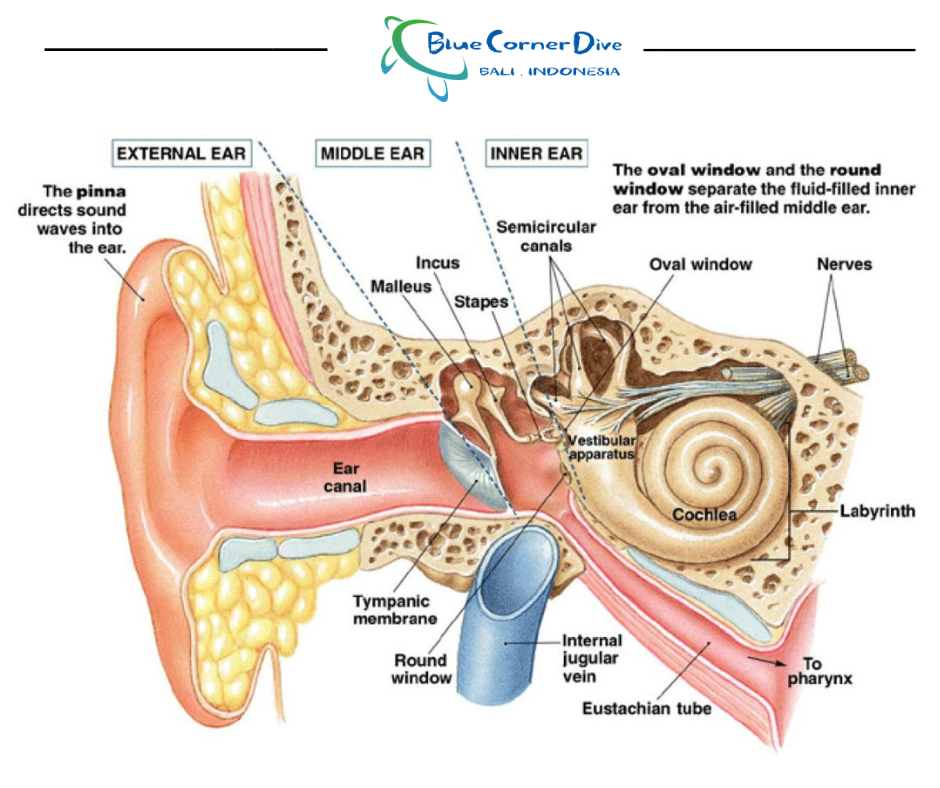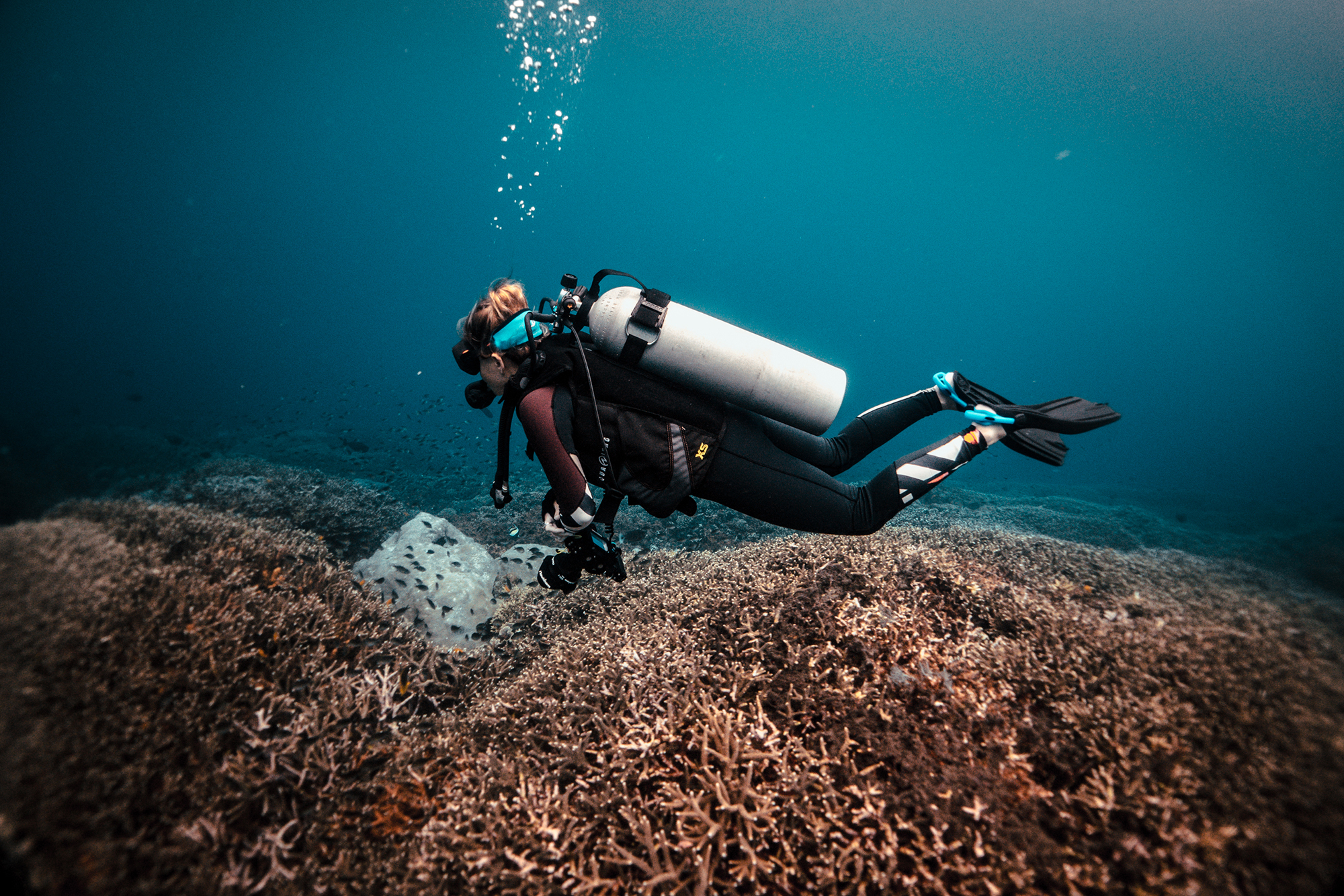What Happens To My Ears When I Scuba Dive?
What’s the first thing you learn when you start scuba diving? To never hold your breath and how to equalize. The two most important things that can prevent a boat load of problems! Since scuba diving is the best damn thing ever, we need to remember to look after ourselves and our health so that nothing will keep us from diving. Ever. So it is very important to know what can go wrong when you dive and how to prevent them. And if you’re not serious about them, they can keep you out of the water for months. And what a nightmare would that be!
Learning how to prevent serious ear problems is something you learn during your very first confined water session during your Open Water Course (and that is to equalize). Yet even the most experience divers have problems caused by not being able to equalize properly. Oh the irony!
So, let’s talk a little bit about ears, what’s in them, what can go wrong and how to prevent ear problems when scuba diving.
Anatomy of the Ear
In order to understand what actually happens to your ears when you scuba dive, you do need to know a bit about the ear’s anatomy. So let’s have a little biology lesson. Don’t worry, it won’t be like your average boring high school type of a lesson, so don’t you dare stop reading! Reward yourself with a beer after your done. Cool? Let’s move on.
Your ear consists of three sections: The external (or outer) ear, middle ear and inner ear. It looks like something like this:
The outer ear
Take a mirror and look at your ear. That flappy thing? That’s your Auricle or Pinna. It’s job is to direct sound into your ear. Then if you would to put something in your ear (hypothetically, please don’t stick things up your ear) you would be in the External Acoustic Meatus aka the Ear Canal. This connects your outer ear to your middle ear.
When your head is underwater, your ear canal fills with water. What’s stopping it from getting any further is your EARDRUM (fancy word for that is: Tympanic membrane). This is what separates your outer ear from your middle ear.
Middle Ear
Needless to say your eardrum is a VERY important lil’ thing. Its job, as mentioned before, is to keep unwanted stuff from getting any further and thus protect the important bits in the middle and inner ear, that control your hearing and balance. We will talk about what happens to your eardrum when you dive in a bit!
Your middle ear is also connected to your Eustachian Tube, which is connected to the back of your nose. When you equalize, you are pushing air into your Eustachian tube, equalizing the dead air space in your middle ear.
Your eardrum also vibrates as sound hits it, which then magnifies and forwards those vibrations to 3 tiny bones called The Ossicles.They then deliver those vibrations to your Oval Window which is what separates your middle ear from your inner ear. The oval window, as well as another tiny window called The Round Window are two of the thinnest membranes in the human body. However, they compensate their size by being some of the most important bits in your ear! Who said that size matters…
Inner ear
Your inner ear is that snail looking bit called The Cochlea (which is actually latin for snail). It is filled with a fluid called the perilymh fluid. As mentioned earlier, the oval and the round window protect the inner ear and keep that fluid inside and also stops anything from going inside.
The eardrum, ossicles and the oval window are all connected. The sound vibration is transferred into the cochlea which then transfers that information in to your brain. That bit is a bit too complicated, so let’s not go there.
What actually happens to your ears when you scuba dive?
We all know pressure increases as we go deeper. That causes your dead airspaces in the ear to shrink. And the decrease of pressure can cause things to rupture. As you descend, the pressure inside your ear causes the eardrum to stretch inwards, as the airspace behind it becomes smaller. If you fail to EQUALIZE, the eardrum will stretch to the point where it will simply rupture. As it ruptures, it lets water into your middle ear and kinda completely defeats the purpose of having an eardrum… You will feel initial pain that is soon relieved as water gets in. Sneaky one. You will however feel how the water gets in and it will feel cold. That’s your queue for a ruptured eardrum. Cold water rushing into your head.
As you ascend, you’re passively equalizing as that extra air pushed into your dead air spaces usually finds its way out on its own. However, if you ascend too fast, your body will not have time to adjust and you might experience a Reverse Squeeze. So everything expands too fast, causing another boat load of problems if you don’t slow down!
Common Ear Problems when Scuba Diving
We refer to pressure related injuries as Barotraumas. Baro = pressure, trauma = injury. Easy! In addition to these, divers can also suffer from ear infections. Here we have listed the most common problems scuba divers experience with their ears.
Otitis Externa or Outer Ear Infection
Oh yes, the good ol’ ear infection (aka divers worst nightmare). Also known as “Swimmer’s ear”, It’s caused when moistness is left in your ear canal which breaks down the protective lubricate barrier of that canal and makes the skin there sensitive. It is the most painful type of infection you can have in your ear. If you’re scuba diving every damn day (aka living the dream), you are very prone to this, as you are constantly filling your ear canals with water (which isn’t the cleanest water either).
Symptoms are usually: pain, muffled hearing, pain when you move your earlobe and more pain. Needless to say you should visit your doc as soon as possible!
Tympanic Membrane Rupture
Remember what Tympanic Membrane stands for? Eardrum! As we mentioned earlier, a ruptured eardrum lets water into your middle ear and you will definitely feel that! When it breaks, it will hurt but will soon feel better as water comes running in. It may cause vertigo and we all know that is NOT a good thing when you’re underwater.. In addition to that, as water gets in it can cause more otitis’s (that’s infection in Latin, btw). A ruptured eardrum always requires medical attention.
Otitis Media or Middle Ear Infection
A middle ear infection is most commonly caused when water gets past the ruptured eardrum. Simple as that. Painful as well and you should see a doc to get it cured.
Barotitis Media
If ya know a bit of latin (like we do), you’ll guess what this is. It’s a middle ear barotrauma. This is actually the most commonly reported problem in scuba diving. It is most commonly caused when the pressure in the middle ear is too great and it causes the blood vessels in the middle ear to rupture. The middle ear will thus fill with fluid and blood.
Symptoms may include the feeling of fluid in the ear and partial or complete loss of hearing. Pain and discomfort will begin immediately after diving and this is exactly the kind of injury that will keep you out of the water for a while! If you’re lucky, just a couple of days, if you don’t take care of it, even months (gross).
Ruptured round window
This is something that can happen is you equalize TOO MUCH or TOO HARD. As you remember, your middle ear is also connected to the Eustachian tube which is connected to the back of your nose. If you push too much air into your Eustachian Tube, that air will shoot up and that pressure can cause the round window to rupture. Remember where the round window is located? Pretty deep, right by the inner ear. Curing a round window rupture will therefore take a looonnggg time… It can also cause the fluid from the middle ear to leak into the middle ear and can completely mess with your balance. Worst case scenario it can also cause permanent loss of hearing, if not treated. Scary stuff!
External Ear Canal Superficial Vessel Rupture
This happens commonly for divers wearing hoods. The pressure can rupture some of the blood vessels in the ear, causing small bleeding. Again, symptoms may mimic other conditions so it’s important to seek medical care if this happens to you.
Remember the rule of thumb: If your ears bleed = see a doctor. If you have pain in your ears after diving = See a doctor.
How to look after your Ears when Scuba Diving
PREVENTION! Shouldn’t surprise anyone. Prevention is the key for healthy ears. It is important to clean and dry your ears after every dive. Think about it, there’s a lot of nasty things floating in the ocean (or lakes). Gross! Also the change of season may cause certain planktons to bloom that will nicely set inside your ear and cause infections. Ew.
In case you do get an infection, it is important to seek medical care as soon as possible. Antibiotics are often prescribed in either drops or pills or both. Serious injuries may also require surgery.
If you find yourself constantly fighting with your ears, you can find scuba diving masks with special ear protectors. Remember, NEVER use regular earplugs for diving, Like NEVER.
How can you Prevent Ear Problems when Scuba Diving?
The number one way to prevent ear problem is to equalize properly. We all do it differently, but as long as you keep gently pushing air into those airspaces, you’re sweet! It is also so important to ascend and descend slowly.
Here are the most common techniques of equalization
1. The Valsalva
The technique you’re probably taught to use first. Pinch your nose and gently blow against your nostrils.
2. The Toynbee
Same as above, but instead of blowing against your nose, you just simply swallow.
3.The Frenzel
Push your tongue against the top of your mouth and make the sound of the letter “k”.
What the cool kids in scuba diving say
We also asked around people from the industry to see if they have any tricks up their sleeves when it comes to treating or preventing ear problems. Here are the most common things mentioned:
Garlic. To aid an already existing outer ear infection. Garlic - nature’s own antibiotic.. It’s as simple as shoving a garlic clove in your ear. It won’t feel nice nor comfy but apparently it will suck any grossness living in your ear. Yes, there will be pain but we’ve heard it kinda helps.
Vinegar & Alcohol solution. Here’s a secret receipe for you. Mix vinegar, rubbing alcohol and mineral water and tadaa! Your ears will dry in a second. Pro tip: put the drops in BEFORE and AFTER diving. This helps to evaporate any water left an has proven to be a very successful prevention against the Swimmers Ear. At first it burns and hurts, so you might want to mix in a bit more clean drinking water as well until you get used to it. This type of solution is often sold in pharmacies as well, but in case you’re living somewhere remote, just know that you can mix them yourself as well!
Your ears will either make or break your dive. So, don’t mess around with ear problems. Seriously. After all, if you can’t dive, what’s the meaning of anything..?
For more information about ears and scuba diving, or if you feel guilty about not seeing a professional for that little pain you’ve been having, visit the Divers Alert Network.





